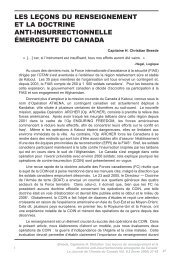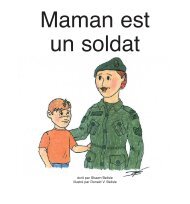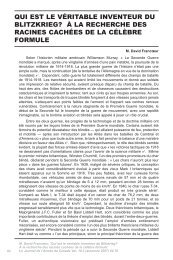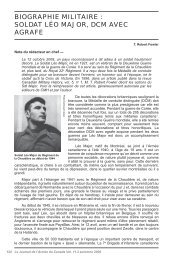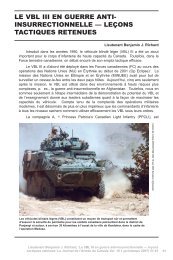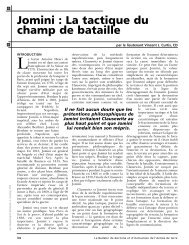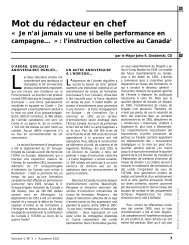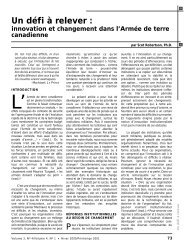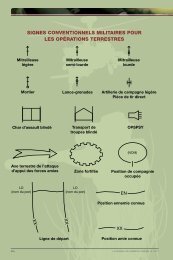The Canadian Army Journal
The Canadian Army Journal
The Canadian Army Journal
Create successful ePaper yourself
Turn your PDF publications into a flip-book with our unique Google optimized e-Paper software.
92<br />
legislation by way of the ITAR and broadened the interpretation of the MEJA to include<br />
contractors. <strong>The</strong> US, however, is not the only nation with such domestic regulations.<br />
In many respects the UK has been the birthplace of the modern private military<br />
company. However, the state of domestic regulation of the industry is somewhat less<br />
advanced than in the US. <strong>The</strong> UK does not have legislation that currently covers the<br />
private military industry. As a result of the 1998 Legg report, which analyzed the<br />
Sandline International “arms to Africa” (Sierra Leone) scandal, recommendations were<br />
made for the British government to commission a Green Paper into the options for the<br />
regulation of the private military industry. 56<br />
This Green Paper produced a series of six options for the regulation of the industry:<br />
banning military activity abroad; a ban on recruitment for military activity abroad; a<br />
licensing scheme for military services; a system of regulation and notification; a general<br />
license for companies; and industry self-regulation. 57 Although the Green Paper was<br />
published in 2002, the UK has not implemented any of the recommendations.<br />
Development of the private military industry has surpassed the ability of<br />
international mechanisms to control this sector. <strong>The</strong> ability to regulate the industry has<br />
defaulted to national domestic law and regulation, with its own unique set of limitations.<br />
<strong>The</strong> UK example, along with the further advanced US state of regulation, demonstrates<br />
the pitfalls that Canada must be conscious of when it contemplates the use of MPFs to<br />
support CF operations.<br />
To better understand what the CF must do in the legal sphere to employ MPFs in<br />
support of operations, it will be useful to understand the current status of civilians under<br />
current international law. <strong>The</strong> first is the status of civilians in relation to the Laws of<br />
Armed Conflict (LOAC). <strong>The</strong> Geneva Conventions and Protocols provide for the<br />
protection of civilians on the battlefield. Unarmed civilians not participating in combat are<br />
to be considered non-combatants. This is a fairly straightforward and understood<br />
principle. <strong>The</strong> second issue is the status of civilians in the employ of armed forces. An<br />
Australian study on the status of civilians in armed conflicts points out that Geneva<br />
Convention III confers prisoner of war status upon:<br />
Persons who accompany the armed forces without actually being members<br />
thereof, such as civilian members of military aircraft crews, war<br />
correspondents, supply contractors, members of labour units or of services<br />
responsible for the welfare of armed forces…58 This definition adequately covers those civilians working for armed forces who are<br />
providing unarmed support such as logistics support or the maintenance of complex<br />
weapons systems. <strong>The</strong> third issue is the status of armed contractors under the LOAC.<br />
<strong>The</strong> dilemma that MPFs have created in the legal domain is described by one author,<br />
who states that these civilians are no longer just accompanying the force, but are<br />
carrying weapons, fixing critical weapons systems, and carrying out other critical<br />
functions. This has created a categorization problem where, “Legally speaking, they<br />
[military contractors] fall into the same grey area as the unlawful combatants detained at<br />
Guantanomo Bay.” 59<br />
This question of whether PMCs constitute lawful combatants is one of the key<br />
questions under review by international humanitarian law (IHL). If MPFs are lawful<br />
combatants, then they are entitled to some form of prisoner of war (POW) status and can<br />
be legally targeted. If they are unlawful combatants, then they have no rights under IHL.<br />
<strong>The</strong> Geneva Conventions are specific in that civilians participating directly in hostilities<br />
are considered unlawful combatants or unprivileged belligerents. <strong>The</strong> key issues then<br />
are whether private military firms are, or are not, lawful combatants and what constitutes<br />
participating in direct hostilities. 60<br />
<strong>Canadian</strong> <strong>Army</strong> <strong>Journal</strong> Vol. 11.1 Spring 2008


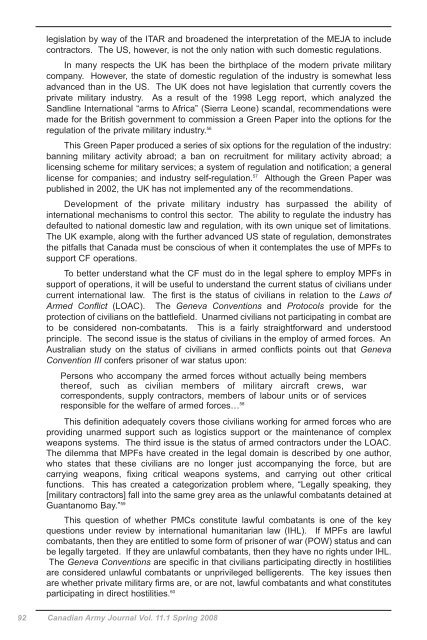
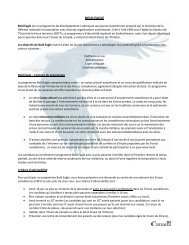
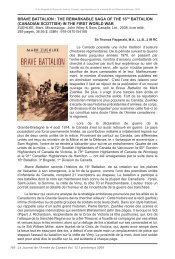
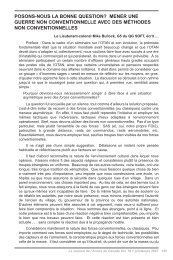
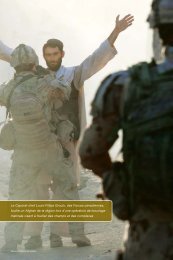
![La modularite dans l'Armee de terre canadienne [pdf 1.6 MB]](https://img.yumpu.com/17197737/1/188x260/la-modularite-dans-larmee-de-terre-canadienne-pdf-16-mb.jpg?quality=85)
